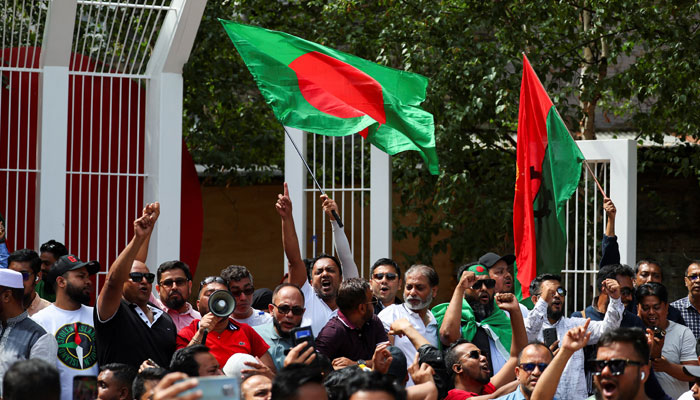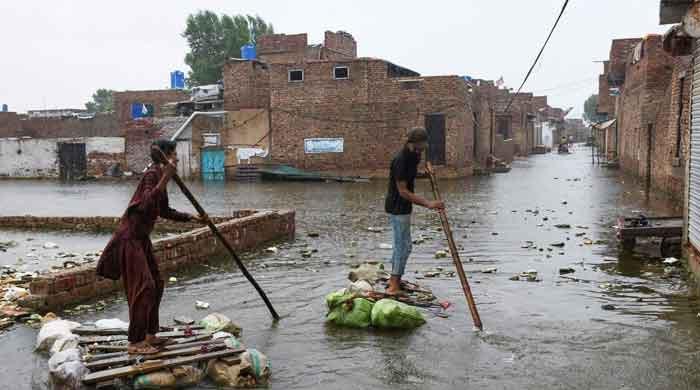How democracy endures
Any attempt to short-circuit democracy creates sufficient conditions for an upheaval
August 08, 2024

Events in Bangladesh need not be an eye-opener. It has been demonstrated often enough that democratic legitimacy through strict adherence to the constitution ensures stability. Any attempt to short-circuit it creates sufficient conditions for an upheaval.
This statement would immediately be questioned as many, unnamed countries are in effect draconian dictatorships and yet are apparently stable. My view is that their surface calm has turmoil breeding within. The force of popular will cannot be stopped forever. It is just that history marches at a different speed in each place.
This passage of history certainly has peculiar characteristics in the post-colonial states of the Indian subcontinent. Whenever authoritarianism has gained control in them, it has been seriously resisted. In Pakistan, Ayub, Zia and Musharraf were all challenged by a people’s movement as was Bhutto’s civilian attempt at complete control. It took time to gather speed, but its emergence was never in doubt.
In India, the imposition of emergency by Indira Gandhi was hugely unpopular and was got rid of in a relatively short time. Since then, only Modi and the BJP have tried bits of authoritarianism but as the recent election indicates, this has not been accepted by the people. Modi remains PM but with many of his powers clipped.
In this context, one question needs consideration. Why has there been no mass movement of the Bangladesh type in India despite great social injustice? The reason is simple; India has managed to evolve elite consensus on the fundamentals of the constitution. One great example of this is the acceptance of election results by everyone and a peaceful transfer of power.
Since the emergency in the mid-seventies, there have been many elections and multiple governments in India. In each case, the transfer of power has happened as per the constitution and peacefully. Despite occasional mutterings, the verdict of the Election Commission has not been institutionally challenged. No one questions anyone else’s right to rule. This legitimacy of the ruling elite prevents mass upheavals.
There are of course insurgencies in different places but the reasons in each case are different. The illegal and forcible occupation of Kashmir is an example where the struggle of the people is for freedom. But, in the mainstream political arena, the conundrum of how to transfer power has been resolved.
Bangladesh since independence has had a complicated history. Alternating between dictatorship and democracy, it has seen the worst aspects of what could be called subcontinental political rivalries. Former prime ministers Hasina Wajid and Khaleda Zia have been at each other’s throats almost constantly. Though both have held office, what has been missing is an unchallenged transfer of power.
Hasina may well have genuinely won the election fifteen years ago but then turned into a complete dictator. Political opponents were targeted, including Khaleda who was imprisoned for long periods. Some from other opposition parties were hanged on flimsy charges. This created a modicum of surface calm but never completely. Some degree of resistance continued throughout her 15-year rule.
Then she overreached as all dictators do and decided to completely rig the last election. The dice were so loaded against the opposition parties that they decided to boycott the polls. A complete whitewash was thus engineered, marginalising all except the ruling Awami League.
For a while, Hasina appeared to get away with it but that was an illusion as later events have proved. What dictators fail to realise is that violations of the constitution may not evoke an immediate reaction, but emotions continue to boil below the surface. All that is needed is a spark to ignite the proverbial prairie fire.
This trigger could come from anywhere. It may have no connection with constitutional violation or other repressive measures. It may even be a social issue. It could be anything that has enough emotive appeal for people to come out in large numbers.
In the case of Bangladesh, it turned out to be the anger against the quota system. This referred to the reservation of government jobs for the families of the so-called freedom fighters principally but also to other groups. In total, 55% of all jobs were thus reserved. Besides denying employment to a majority, it also allowed the ruling party many opportunities for patronage. The most affected were of course young people looking for jobs and no surprise that the students led this movement.
The degree of state violence it generated is unbelievable but not a surprise. The initial reaction of all dictators is cruel repression. Hundreds were killed, many more injured and thousands arrested. This had zero effect. Instead of calming the situation, it just added fuel to the fire. The tipping point had been reached and there was no going back. Even though the quota system issue appeared to have been resolved, it did not douse the fires. Hasina Wajid had to go.
The forces of change once unleashed are hard to put down. History often moves slowly but inexorably towards change. Then something comes to hurry the process along. During the Arab Spring, it was one man’s protest in Tunisia against police corruption and violence.
In Bangladesh, it was the quota system. Against Ayub in Pakistan in the late sixties, the trigger point became students. They were beaten up by customs people bringing back smuggled goods from Landi Kotal. These were relatively minor issues and should not have led to major upheavals, but the underlying cause was potent — a deep dissatisfaction with authoritarian rule.
People all over the world are unhappy and restive about government actions. Elite capture is not just specific to third-world countries. In one form or another, it is present everywhere. What stops some countries from imploding and others from riding over their difficulties is escape valves and none is more potent than democracy and rule of law.
When Marxists describe what they called ‘bourgeois democracy’ as the executive committee of the ruling class, they have a point. Most often, governments the world over protect the interests of their elites. What makes this palatable to the denied majority is a feeling of participation and protection of their rights.
Elections also play a huge part in this — provided they are fair and free and, most importantly, seen as such. This gives legitimacy to those the people choose to rule over them. In this manner, social order is kept through adherence to constitutionalism and rule of law. This is how the pain of inequality and elite capture is minimised if not eliminated altogether.
This simple formula third-world dictators refuse to understand. Besides being busy extracting maximum resources for themselves and their families, they often delude themselves into thinking that they are the best thing that has happened to their country and without them, the state will collapse.
This mental overreach allows for all kinds of excesses to take place until the day of denouement dawns and they either beat a hasty retreat abroad — as Hasina has done — or are taken down by the people.
It is sometimes argued that the results of this popular revolt often lead to authoritarian rule. True — but the inexorable march of history continues. Short-term conclusions may well be faulty. Former Chinese PM Zhou Enlai was reportedly once asked what he thought of the French Revolution. His reply was: it is too early to tell. Here was someone who understood the broad sweep of history.
The writer served as the federal minister of education in the PTI’s federal government. He can be reached at: shafqatmd@gmail.com
Disclaimer: The viewpoints expressed in this piece are the writer's own and don't necessarily reflect Geo.tv's editorial policy.
Originally published in The News











